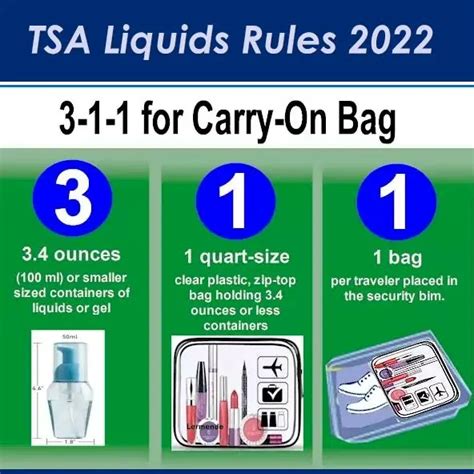Traveling
TSA Liquid Guidelines

Understanding the TSA Liquid Guidelines
The Transportation Security Administration (TSA) has established guidelines for carrying liquids, gels, and aerosols in carry-on bags to ensure the safety of all passengers. These guidelines are often referred to as the 3-1-1 liquids rule. Compliance with these regulations is crucial to avoid any inconvenience during the security screening process. In this article, we will delve into the details of the TSA liquid guidelines, what they entail, and how to navigate them efficiently.
The 3-1-1 Liquids Rule Explained
The 3-1-1 liquids rule is a straightforward guideline that dictates the volume and packaging of liquids, gels, and aerosols that can be carried in a passenger’s carry-on luggage. Here’s a breakdown of what the rule entails: - 3: Liquids, gels, and aerosols must be in containers of 3.4 ounces (100 milliliters) or less. - 1: These containers must be placed in a 1 quart-sized, clear, plastic, zip-top bag. - 1: Only 1 zip-top bag is allowed per passenger.
Items Considered Liquids, Gels, or Aerosols
It’s essential to understand what items are classified as liquids, gels, or aerosols under the TSA’s guidelines. These include but are not limited to: * Beverages * Shampoos and conditioners * Lotions and creams * Perfumes and colognes * Toothpaste * Deodorants * Cosmetics * Aerosol sprays
Packing Liquids, Gels, and Aerosols
To comply with the TSA’s 3-1-1 liquids rule, follow these steps: 1. Check Container Sizes: Ensure that each container for your liquids, gels, and aerosols is 3.4 ounces or less. 2. Use a Clear, Quart-Sized Zip-Top Bag: Place all your compliant containers into a clear, plastic, quart-sized zip-top bag. This bag must be completely transparent to allow for easy screening. 3. Limit to One Bag per Passenger: Remember, each passenger is allowed only one zip-top bag. 4. Screening Process: During the security check, you will need to remove your zip-top bag from your carry-on luggage and place it in a bin for X-ray screening.
Exceptions to the 3-1-1 Rule
There are certain exceptions to the TSA liquid guidelines that are important to note: * Medications: Prescription medications, breast milk, and baby formula are exempt from the 3-1-1 rule. However, it’s recommended to declare these items at the security checkpoint and be prepared to provide additional information or documentation. * Duty-Free Items: Duty-free liquids, gels, and aerosols in secure, tamper-evident bags are allowed in carry-on bags if: + The item was purchased internationally and is still in its original packaging. + The item is protected by a secure, tamper-evident bag. + The passenger has not opened or altered the item in any way. * Special Items: Other items like certain medical equipment, might have specific guidelines, so it’s always best to check with the TSA before your flight.
Preparing for Your Flight
To make your travel experience smoother, consider the following tips: - Plan Ahead: Familiarize yourself with the TSA liquid guidelines well before your flight. - Pack Wisely: Only pack essential items in your carry-on to minimize screening time. - Check with Your Airline: Some airlines may have additional restrictions or recommendations for carry-on items.
🛬 Note: Always check the TSA's official website for the most current information on travel restrictions and guidelines before your flight.
Conclusion of Travel Preparations
In conclusion, understanding and adhering to the TSA liquid guidelines is crucial for a hassle-free travel experience. By knowing what items are considered liquids, gels, or aerosols, how to pack them, and what exceptions apply, you can navigate airport security with confidence. Remember, safety is the top priority, and complying with these regulations ensures a safe journey for everyone.
What is the 3-1-1 liquids rule?
+
The 3-1-1 liquids rule states that liquids, gels, and aerosols in containers of 3.4 ounces or less must be placed in a clear, quart-sized zip-top bag, with only one bag allowed per passenger.
Are there any exceptions to the 3-1-1 rule?
+
Yes, there are exceptions for certain items like prescription medications, breast milk, and baby formula, as well as duty-free items in secure, tamper-evident bags.
How should I pack my liquids, gels, and aerosols for a flight?
+
Pack your liquids, gels, and aerosols in containers of 3.4 ounces or less, place them in a clear, quart-sized zip-top bag, and ensure you have only one bag per passenger.